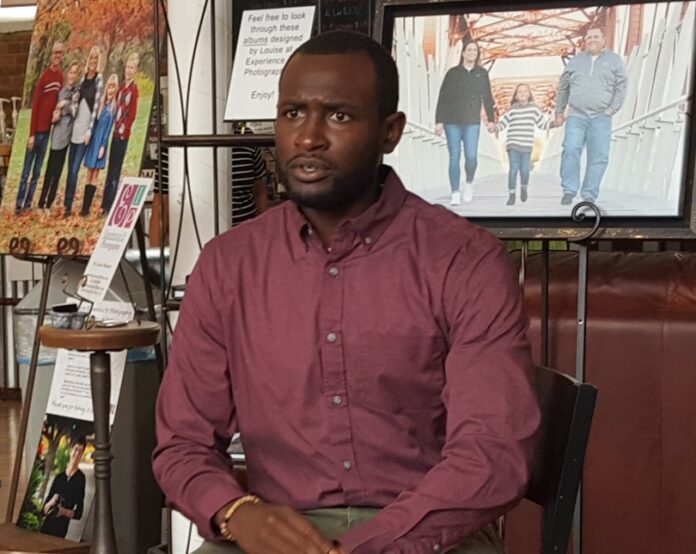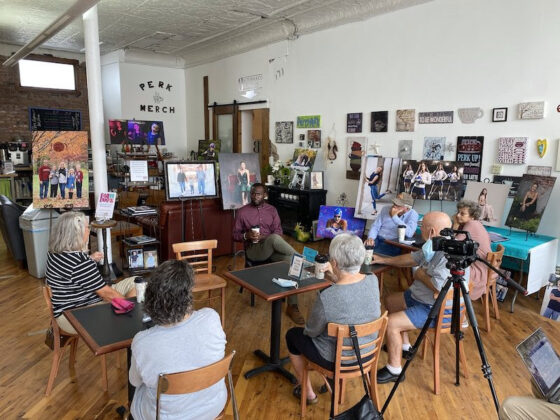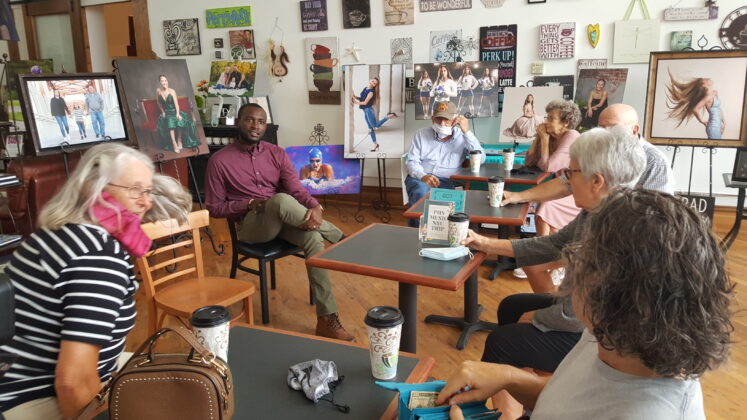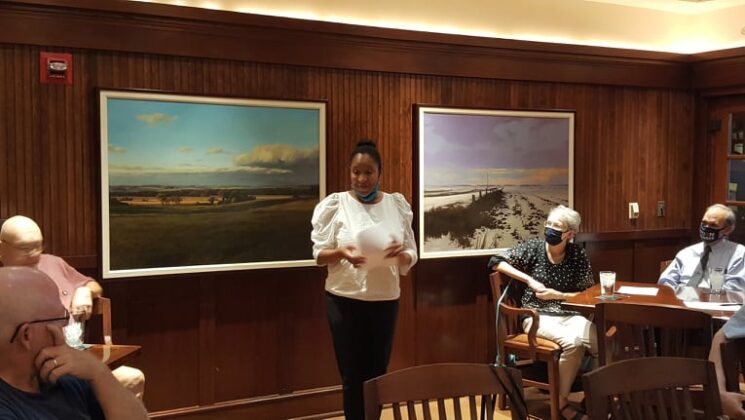
Iowa gubernatorial candidate Ras Smith of Waterloo and Iowa Democratic Party First Vice Chair June Owens of Des Moines made recent visits to Perry to meet with local Democrats and strategize over the ongoing races for state and local offices.
The 33-year-old Smith, an Iowa native with a master’s degree from UNI, is a third-term lawmaker in the Iowa House of Representatives. His last visit to Perry was in March, and he announced in June his campaign for the 2022 Democratic nomination for governor.
Smith’s father retired after 43 years at the John Deere factory in Waterloo. His mother was an MP in the military. She later worked as a substance abuse counselor and has now been a Baptist pastor for more than 20 years. Smith has two daughters with his wife, Amelia, who is a special education teacher in the Waterloo Community School District.
He has been the ranking member on the Iowa House Education Committee for three years, and education was the first issue he raised in his Perry visit, which happened shortly after Iowa Gov. Kim Reynolds revealed that her anti-mask policy for schools was informed by meetings with an Ankeny woman with links to QAnon anti-vaccine extremists. Reynolds also appeared in a campaign video for another Ankeny anti-mask candidate.
“We need to preserve the best parts of our heritage,” Smith told a small group at the Perry Perk coffeehouse, “such as our local elections not being partisan, like school board elections. That’s the Iowa that I know. We took pride in keeping that delineation and keeping the stuff at the local level nonpartisan. We don’t need neighbors fighting with neighbors. We don’t need folks on the school board having political agendas because the goal is to take care of students, educators and families. So the fact we’re injecting the overarching statewide politics into our local elections, I think that’s damaging for our communities. We’re losing our way when it comes to things like that. This might be an idea that doesn’t sound too ‘progressive,’ but I believe in preserving the foundation of our state.”
Smith comes off less as a radical than as a straight arrow, just the sort of moderate politician that Iowa used to produce in abundance. His first year in the Iowa Legislature saw the Iowa GOP’s radical elimination of the state’s 45-year-old collective bargaining agreement with public sector workers, including school teachers.
“In every one of those years, I’ve had to fight to stop vouchers,” Smith said. “In every one of those years, I’ve had to push back to make sure that IPERS stays intact. In every one of those years, I’ve had conversations not just with educators but parents, paraeducators and associates, talking about resources that are needed, and it’s not just more spending but where we’re spending. We’re not allocating dollars toward student support services, toward student brain health as well as mental health. We’ve got to really invest those dollars so we don’t have to pay for it on the back end. If we don’t address it now, we find ourselves addressing it in our criminal justice system.”
Iowa’s criminal justice system is another state institution that Smith understands. In the troubled weeks following the murder of George Floyd in Minneapolis in May 2020, Smith steered a police reform bill — called the Plan for a More Perfect Union — into Iowa law that banned chokeholds and brought some accountability for police brutality in the state by prohibiting officers fired for serious misconduct from being rehired by other law enforcement agencies. The bill also authorized the Iowa Attorney General to prosecute officer-involved shootings.
“I won’t lie to you,” Smith said. “It wasn’t easy. I was tasked with bringing together members of law enforcement, Black Lives Matter, GOP leaders and Gov. Kim Reynolds.”
The Plan for a More Perfect Union passed unanimously at the height of the crisis in June 2020. Once passions began to cool among Iowa’s racial-justice protesters, however, they became enflamed among Reynolds’ law-and-order base and by June 2021, Reynolds was signing the Black the Blue bill, which stiffened penalties against protesters and left in place racial-profiling policies.
“Since then, the governor has worked tirelessly to undermine what we did,” Smith said. “Rather than bring us together, she pitted Iowans against one another — passing a bill that would allow people to run over protesters if they blocked traffic.”
Smith was similarly critical of Reynolds’ anti-immigrant stunts at the nation’s southern border. He also predicted the Republican-controlled statehouse will very likely pass a Texas-style fetal heartbeat bill once the lawmakers convene in January 2022, and Reynolds will sign it.
June Owens, who was elected her party’s first vice chair in December 2019 after previously serving as second and third vice chair, brought the Perry Democrats up to date on redistricting issues. Owens visited the Hotel Pattee prior to the Iowa Senate Republicans’ rejection of the first map proposed by the nonpartisan Iowa Legislative Services Agency (LSA). Reynolds has proclaimed Thursday, Oct. 28 as the date for a second special legislative session to consider the second LSA map of new legislative and congressional districts.
“We’re watching the redistricting process very closely,” Owens told about a dozen Perry-area Democrats. “We want the process to be fair, with no partisan amendments during the special legislative session,” she said.
Owens characterized Reynolds’ COVID-19 policies as “reckless public health decisions that impact the lives of Iowans,” and she criticized the governor’s announcement in September of a $100 million investment in Iowa housing as amounting to Reynolds’ taking credit for federal funds from the American Rescue Plan Act, a bill that she herself campaigned against.
Owens also discussed the Iowa Democratic Party’s Build Our Bench recruitment program, and she encouraged citizens to run for local offices on school boards, city councils and county boards of supervisors.





















